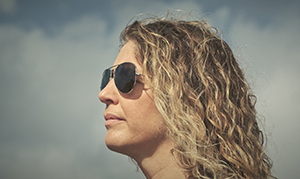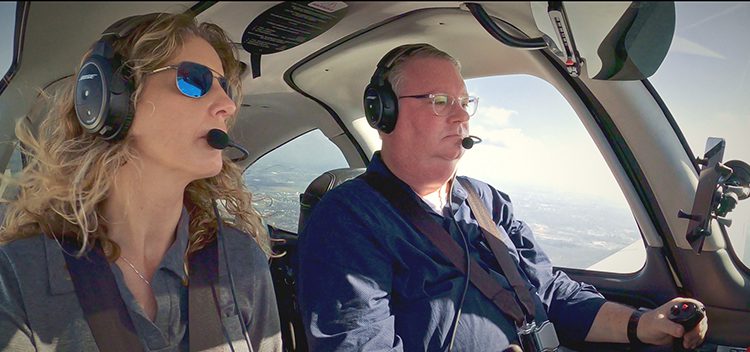By Kim J Stevens
Most data sources estimate that at any given time, there are 27.6 million victims of human trafficking globally. Fifty-four percent of survivors of human trafficking say that transportation is a barrier to leaving their situation. Today, there is one organization that is working to remove that barrier, and that’s by utilizing general aviation.

“Human trafficking occurs everywhere, whether we recognize it or not, says Jared Miller, Co-Founder and Executive Director of Freedom Aviation Network (FAN). “We are aware that a lack of safe transportation is a barrier to leaving a victim’s situation. We seek to eliminate this barrier and provide life-changing transportation services to people who have been so deeply wounded. Not only will we assist bringing them out of their situation, but we will also help them reunite with their families, go on short home visits, take them to court appointments, and more.”
That vision of using general aviation was not always clear. In 2020, Miller had been leading anti-human trafficking efforts globally for several years. He became burdened with the weight of recognizing that transportation was the single most cumbersome, time consuming, costly, and often risky task that anti-trafficking agencies incurred in their efforts to serve survivors. After an extremely complicated rescue operation was successful, he became overwhelmed with frustration at how unnecessarily challenging providing such a seemingly simple service could be on organizations and survivors. That’s when the idea of using private aviation came to him, but with no experience in the industry, he was unsure how it would be possible to produce a solution.
After reaching out to several trusted friends and colleagues, he realized there truly seemed to be no one else trying to make this happen. So, in the summer of 2020, Miller embarked on the task of becoming a private pilot so he could assess the industry, make connections, all of which would hopefully lead him to answers. He was then connected with Stephanie Lamar, who at the time was a CFII, and they quickly began discussing this vision. “Stephanie was the first person to believe that something surely could be done regarding this idea,” said Miller. “She went out and began recruiting pilots. We began crafting this mission under a local anti-trafficking group and quietly worked on it for over two years.” In 2022, Lamar began hearing a demand within the pilot community for inclusion in this opportunity and together they decided to create Freedom Aviation Network.

Lamar, who is Co-Founder and Operations Officer for FAN, experienced her first flight when she was 9 years old in the back of a Cessna 172. “I knew right then that I wanted to become a pilot and learn to fly. I had never felt so free, and even at that age, I really enjoyed being above the world.” Lamar started her journey in aviation at age 22 with her first flight lesson. It took many years and bumps in the road, but she is now a First Officer with GoJet airlines, flying the CRJ-550.
Currently, FAN has 72 pilots fully onboarded in 29 states. These numbers are growing daily as the word spreads among the aviation community. Both Miller and Lamar agree that every time a pilot makes a flight, they are hooked, ready to sign up for more, and tell their friends. “We are averaging five flight requests a month and anticipate that number will increase quickly as our reputation spreads among the anti-human trafficking community. The true demand is incalculable.”
The area where the organization is seeing the most flight requests is in the southeast USA. “This region, it is where a majority of our pilots reside, and our reputation within the anti-trafficking community is strongest,” said Miller. “We have received requests from across the country and our ability to render aid is directly contingent on having pilots available across the country.” The Freedom Aviation Network seeks pilots who are willing to remain flexible and on-call across the country as it’s never known when or where the next call might originate.

Miller shared one example where they were asked to coordinate a flight for a survivor who had made the very brave decision to leave her situation and seek restorative care. “She needed to get far away, and her case manager was able to help her find a recovery program out of state. The case manager was working directly with local law enforcement as the situation was complex and had a certain level of risk. We were able to successfully coordinate the flight and she was safely on her way to her new life. Since then, the law enforcement agent involved in her case has told FAN that she is absolutely thriving and that getting her as far away from her old life as possible was exactly what was missing before every other time she had tried to escape. She is even getting ready to begin a college degree program! She has been clean longer than she can remember, and she has the tools to thrive. Because of the strides she has made, she is able to testify against her trafficker with the hopes of stopping many other people from being exploited. FAN is on standby ready to fly her to her court appointments, home to her family, or on to her next phase as she seeks holistic restoration and peace.
“I was once a young woman that needed someone to step in and help me out of my situation,” reflected Lamar. “It is amazing how many adults don’t step in to deal with the hard situations, and really be that person on the other side that can rescue you, and really follow through and take you into a place of safety. Now I have that opportunity to be the person on the other side, and if all it takes is a flight to get someone to safety, then that is what I will do.”
The organization is seeing a 50/50 split between short and long flights. They have had flights from Florida to Texas, Minnesota to California, Texas to Pennsylvania, and some as short at 150nm. “We need people who can fly 300nm or less and people who can fly long distances,” says Miller. They need pilots with aircraft that can support multiple passengers, although Miller notes that 90% of the time, they have 2 passengers on board (the survivor and the advocate). If a survivor is present, they always have an advocate. But sometimes they take just the advocate to a site visit, survivor interview, anything that supports the survivor’s ability to seek restoration.
“I know what it is like to be forgotten, abused, violated, neglected, abandoned, and at rock bottom,” shared Miller. “I know what it is like to wonder if there is anyone out there who cares. It is not my job to save everyone. What I can do is help one person at a time. I wake up every morning knowing that today I have an opportunity to show someone who is in their most defeated moments how deeply loved they truly are and remind them that they are infinitely valued.”

At first, Lamar was a little overwhelmed by the idea that she couldn’t save everyone, and that as many people as they fly to safety, there would always be those left behind. “Then Jesus reminded me that he is the shepherd, and he will leave the 99 to get the one. So, we at Freedom Aviation Network are here ‘For the One.’ Each flight carries someone to safety,” said Lamar. “One at a time we are making a difference.”




